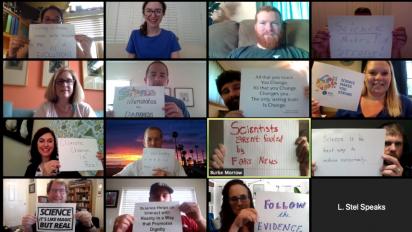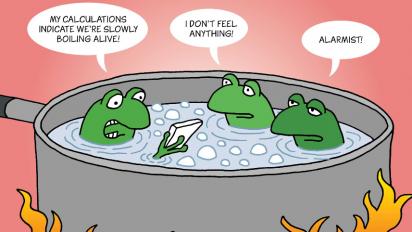Navigating conversations with climate change deniers? Read this book.
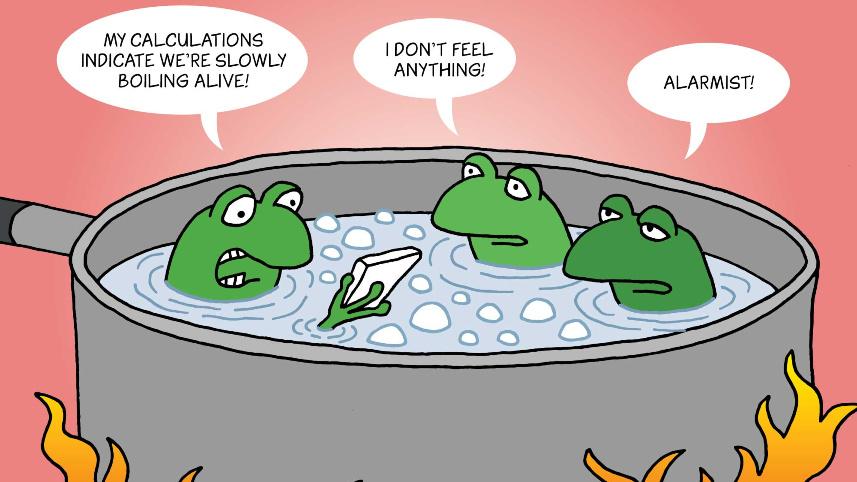
Illustration by John Cook.
Picture this: You’re at a gathering of friends and family—it might be a holiday or a celebration—but you’re feeling pretty good and loving the moment, drifting from conversation to conversation on a gentle tide of interactions. A new eddy of conversation begins. Someone mentions the state of the environment and you’re excited to share your knowledge on a subject you either teach or are quite passionate about—when it happens, out of nowhere: someone you have great affection for utters the dreaded words: “Climate change has been natural in the past, therefore, current climate change is not human-made.”
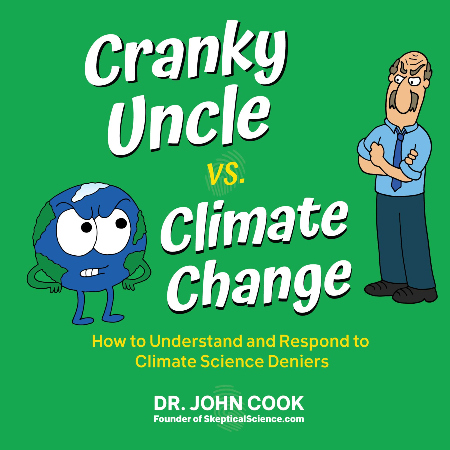 Until now, such sentences could bring a family gathering to a standstill. Enter John Cook’s new book, Cranky Uncle vs. Climate Change, which might help end these awkward moments. This new (and greatly humorous) how-to book on responding to climate science deniers is a great, informative read for anyone trying to figure out how to navigate conversational landmines that often occur both in and out of the classroom. The book of cartoon illustrations, full of humor and insight, examines the plethora of basic misconceptions about climate change often expressed by our own versions of cranky uncles.
Until now, such sentences could bring a family gathering to a standstill. Enter John Cook’s new book, Cranky Uncle vs. Climate Change, which might help end these awkward moments. This new (and greatly humorous) how-to book on responding to climate science deniers is a great, informative read for anyone trying to figure out how to navigate conversational landmines that often occur both in and out of the classroom. The book of cartoon illustrations, full of humor and insight, examines the plethora of basic misconceptions about climate change often expressed by our own versions of cranky uncles.
Since I work with Cook on a regular basis developing NCSE’s misconception-busting lesson plans, I might be accused of bias. However, as a former teacher, I can objectively say that Cook’s new book is an incredible educational resource for handling difficult situations that often arise when teaching about climate change, as I’ve met my own share of climate deniers throughout my career.
During a recent conversation with Cook, I asked him why he wrote Cranky Uncle in the first place. Cook answered by quoting statistics from his research on the psychology of climate denial: approximately 60% of people surveyed about climate change were concerned and alarmed but stayed fairly silent about the issue due to lack of knowledge; 30% were simply disengaged and uninterested in the topic; and the final 10% fell into the category of “cranky uncles,” also known as climate deniers. In light of these data, Cook began to focus on the concerned and alarmed group, knowing that the climate denier group would be unlikely to pick up his book in the first place. In providing a guide for the concerned and alarmed, Cook wanted to ensure that they could initiate and engage in climate conversations with confidence and knowledge, rather than remain silent or rely on gut feelings.
I also wanted to know if the Cranky Uncle character was a real person from his own life. Cook laughed in response and said that the character was more an amalgam of the types of climate deniers he has encountered throughout his life’s work. He developed the Cranky Uncle character as a coping mechanism for all the negativity he often receives through his publications and research. As a teacher, I completely understand the need for coping mechanisms because educators are often questioned about our authenticity by both students and parents, as well as the occasional administrator. Cranky Uncle has the potential to help us all defuse these kinds of difficult situations with knowledge and just the right mix of humor.
Additionally, Cook is just about to release a Cranky Uncle app for iOS and Android mobile devices. The app allows students (or anyone with an interest) to work through a series of scenarios to understand how climate denial arguments can be overcome with a bit of simple logic and a great deal of scientific data. NCSE is excited about the release of this app and is working with Cook to develop ways for teachers to implement this resource in their classrooms.
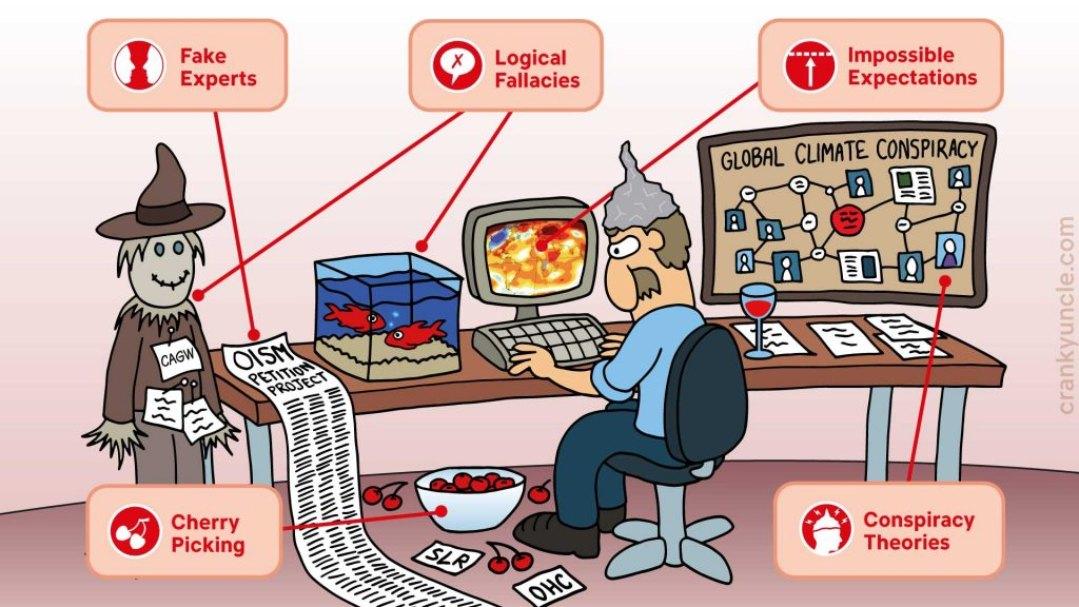
Illustration by John Cook.
In both his book and app, Cook continues to advocate for misconception-based learning, focusing on five techniques of science denial that he has identified: Fake Experts, Logical Fallacies, Impossible Expectations, Cherry Picking, and Conspiracy Theories (FLICC for short). These five core tactics have been and continue to be the basis for the majority of climate denial arguments. FLICC is depicted quite well in Cranky Uncle and readers will find the treatment very easy to understand. The numerous graphics and summary charts available in the book will provide teachers with an easy reference guide to hit any curveball a student might throw their way when teaching on the critically important topic of climate change. Thank goodness John Cook has given teachers an excellent tool to cope with the cranky uncles they sometimes encounter on a daily basis.
This article has been modified slightly from its original print format.




